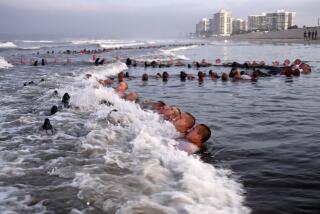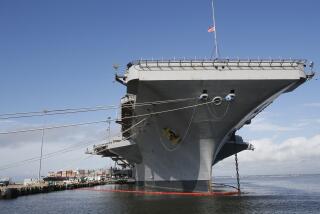Sub Skipper Has Job Offers, Will Resign From Navy
- Share via
The captain of the Navy submarine that was involved in a deadly collision with a Japanese fishing boat has had several private-sector job offers and will resign from the Navy once he has been disciplined, his attorney said Saturday.
Cmdr. Scott Waddle was allowed Friday to review the court of inquiry report about the deadly collision between the submarine Greeneville and the Japanese trawler Ehime Maru, said Charles Gittins, the Virginia lawyer representing the 41-year-old skipper.
Waddle has been summoned to an administrative proceeding called an “admiral’s mast” at 8 a.m. Monday in Pearl Harbor, Hawaii, with Adm. Thomas Fargo, commander of the Pacific Fleet.
Fargo will listen to Waddle’s explanations of the charges levied against him by the three admirals who made up the court of inquiry into the Feb. 9 collision, in which nine Japanese crew members, instructors and students were killed.
“We have been assured that Adm. Fargo will meet with Scott with an open mind,” Gittins said.
Fargo accepted the court of inquiry’s unanimous recommendation to hold an admiral’s mast rather than order Waddle to a court-martial to face criminal charges.
The court, aided by Navy lawyers, decided that the mistakes made by Waddle and other crew members that led to the crash were not done with malice or with knowledge that a collision was likely.
In avoiding a court-martial, Waddle may also have been aided by his decision to testify at the court of inquiry and to take full responsibility. He testified despite Fargo’s rejection of his request for testimonial immunity.
Waddle underwent five hours of detailed, sometimes hostile questioning from Vice Adm. John Nathman, Rear Adm. Paul Sullivan and Rear Adm. David Stone.
Gittins, who has represented military members in several high-profile proceedings, said he was impressed by “the courage it took Scott to take the stand and withstand cross-examination from three admirals who needed to look tough with him for the public and [the] Japanese people.”
Gittins added that Waddle and his wife, Jill, who accompanied him each day to the court of inquiry, “have weathered with dignity a very difficult time since the accident. Jill’s support has been a source of incredible strength to Scott.”
He did not say who had contacted his client about jobs.
Fargo has the authority to order Waddle reduced in rank, fined and confined to quarters; he can also put a letter in Waddle’s file making him ineligible for promotion.
Navy sources said Fargo will put such a letter in Waddle’s personnel file but probably will not order him reduced in rank.
An admiral’s mast--or, for enlisted personnel, a “captain’s mast”--is the modern equivalent of an age-old maritime practice where sailors who broke rules at sea were ordered to stand before the ship’s mast and receive their punishment.
The mast for Waddle will take place in Fargo’s office.
Still, an officer or enlisted sailor has the right to appeal punishment meted out at a mast, even to request a court-martial, although that is rarely done.
Soon after the admiral’s mast, Fargo is expected to announce details of his decision.
Navy sources have said a Greeneville sonar analyst will be sent to a captain’s mast for punishment, four officers will receive reprimands and changes in the Navy’s Distinguished Visitors public relations program will be recommended.
The submarine hit and sank the Ehime Maru while surfacing rapidly to impress 16 civilians on the sub.
The court of inquiry determined that the sub failed to detect the trawler because of mistakes by the sonar analyst and because Waddle had created a “command climate” where other crew members were afraid to challenge him when they saw him cutting corners on safety.
“A classic case of the dangers of the one-man show,” one submarine captain said.
Gittins said he expects his client to submit his resignation “a short time” after the admiral’s mast proceeding is completed and after any penalties have been satisfied. If Fargo opts for a short period of confinement to quarters--a military version of house arrest--that could stretch into May.
In May, Waddle will have served in the Navy for 20 years, a significant mark in setting pension benefits. Gittins said Waddle is looking forward to retiring as a commander.
Before the collision, Waddle had already been tentatively selected for promotion to captain. As a protege of Rear Adm. Al Konetzni, commander of the Pacific submarine fleet, Waddle’s career was on the rise.
During his two years as captain of the nuclear-attack submarine Greeneville, Waddle and his crew had been highly praised. When a television network wanted to do a documentary aboard a submarine, the Navy sent the TV crew to sea with Waddle and the Greeneville.
When Waddle was asked to take the 16 civilians to sea on Feb. 9, he accepted the task with his normal gusto. He even showed them how fast and deep the sub can go, which are considered Navy secrets.
One of the civilians said that after the collision, Waddle told his visitors, “It wasn’t supposed to be that way. It was supposed to be a lot of fun.”
More to Read
Sign up for Essential California
The most important California stories and recommendations in your inbox every morning.
You may occasionally receive promotional content from the Los Angeles Times.













